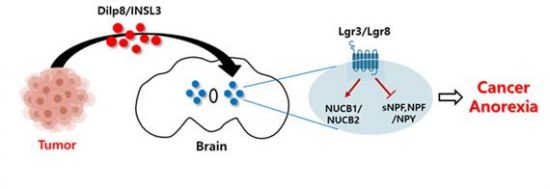Korean researchers, including Dr. Yoo Kwon’s team at the Korea Research Institute of Bioscience and Biotechnology, published a paper in the journal Nature Cell Biology on the 9th.

A model of the pathogenesis of eating disorders caused by cancer. Photo courtesy = Korea Research Institute of Bioscience and Biotechnology
[아시아경제 김봉수 기자] Researchers in Korea are attracting attention by identifying the cause of eating disorders in cancer patients. It discovered a mechanism by which a specific protein (Dilp8/INSL3 peptide), which is specifically secreted by cancer cells, regulates appetite control hormones through specific receptors (Lgr) in cranial nerve cells. If it leads to the development of therapeutic agents in the future, it is expected that it will be able to significantly improve the effects of cancer patients’ eating disorders and chemotherapy.
On the 18th, the Korea Research Institute of Bioscience and Biotechnology, a doctoral research team at the Voted Disease Target Structure Research Center, and a doctoral research team at the Bionano Research Center, Gyusun Lee and Jae-myung Seo’s team at KAIST, and a professor at Seoul Asan Medical Center, Song-cheol Kim, have released the results It was announced that the paper was published in the online edition of the international journal Nature Cell Biology on the 9th.
According to the progression of cancer, tumor tissues and cancer cells secrete various cancer secreting factors (tumorkine) and inflammation inducing factors (cytokines) to reduce the function of normal tissues, leading to complications and reducing survival rates. Especially Cancer cachexia-anorxia syndrome, a typical complication of cancer patients, is a serious eating disorder and continuous weight loss resulting from adverse effects on cancer patient survival and chemotherapy. The cause was unknown.
The research team confirmed that the expression and secretion of a specific protein (Dilp8 peptide) derived from cancer cells was significantly increased through the Drosophila cancer model and RNA transcript analysis. In addition, it was found that it induces eating disorders in the Drosophila cancer model by changing the expression of the neuropeptide hormone involved in appetite regulation through the receptor (Lgr3) of cranial nerve cells.
Based on the results of this study, Professor Seo’s team found that INSL3, a homologous factor with a specific protein (Dilp8 peptide), was significantly increased in mice, causing eating disorders.In particular, the protein secreted from cancer cells (INSL3) was directly transferred to the mouse brain. In the case of injection, it was confirmed that food intake and weight were reduced.
Prof. Song-cheol Kim’s team conducted a clinical relevance study in pancreatic cancer patients with the highest incidence of cachexia, and confirmed that the concentration of the protein (INSL3) was high in pancreatic cancer patients with eating disorders.
In other words, the protein secreted from cancer cells (INSL3) acts on the nerve cells involved in the regulation of appetite in the cranial nervous system, reducing the appetite of cancer patients, which means that the corresponding protein (INSL3), a cancer secreting substance, induces eating disorders in cancer patients. It was confirmed that it acts as an important signal factor.
Dr. Yoo Kwon, the research director, said, “The basic and original research results found in the Drosophila experimental model were confirmed in mammalian rats and reconfirmed in the clinical studies of cancer patients.” “Through the diagnosis and control of the newly identified protein (INSL3), “If a treatment strategy that can solve the eating disorders and eating disorders of cancer patients is developed, it will be helpful in the development of metabolic disease treatments for the general population as well as effective chemotherapy aids for cancer patients.”
Reporter Kim Bong-soo [email protected]
